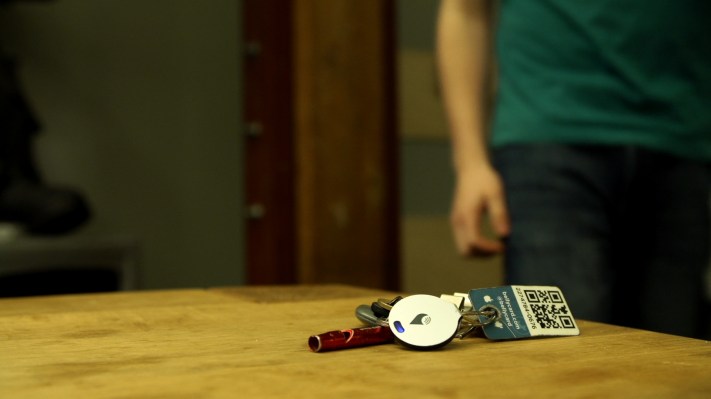It’s crunch time for TrackR, that startup that lets you use an app to find items like keys, wallets and bags that have been tagged with its small Bluetooth-based tracking devices. TechCrunch has learned and confirmed that the company has laid off a substantial proportion of its staff, as it seeks to sharpen its focus amid a wider market contraction for item-tracking businesses.
The company did not confirm how many have been let go, nor how many are remaining in a statement that it provided to TechCrunch via a spokesperson:
“As TrackR’s strategy evolves, the organization needs to evolve, too,” it notes. “The recent rebalancing of TrackR’s workforce is to ensure the company remains efficient and focused on areas that will deliver on TrackR’s vision. The company is continuing to position itself to lead the item finding space.:
A source tells TechCrunch, however, there were 42 employees let go (a number also noted in this recent review on Glassdoor). LinkedIn lists just over 90 connected to the the company (including investors and board members), while PitchBook notes 35 employees, meaning that this could be more than half of TrackR’s staff.
The downsizing comes at a tricky time, both for TrackR and the wider space of device tracking startups.
From a high point of raising $50 million in August 2017 at a valuation of just over $201 million –investors included Steve Case’s Revolution Growth, Amazon (via its Alexa Fund), the Foundry Group, Docomo Capital and others — Trackr has had a series of stumbles, some unforeseen.
In December, Chris Herbert — who co-founded the company with Christian Smith in Santa Barbara after one of them lost a set of keys on the beach when surfing (the startup was originally called Phone Halo) — stepped down as the CEO (we believe Smith is still at the company as president). Herbert was replaced by COO Nate Kelly, who is now leading the company.
In the same period of time, natural disaster also hit the company, with the area where TrackR and its employees are based hit first by fires, and then mudslides. A separate contact told TechCrunch that the fire crisis was the reason for TrackR backing out of having much of a presence at this year’s CES — which is otherwise a major event for hardware companies.
The layoffs, which seem to have taken place in the last several weeks, are not the only ones in the device tracking market. Tile, TrackR’s closest rival, laid off dozens of employees in January after a disappointing holiday sales season.
TrackR has not cited sales problems for its own layoffs, and our original source for this story claimed it was more due to the company burning through cash too fast.
“They are calling it restructuring, but they are burning cash at an alarming rate,” the source said.
For what it’s worth, Amazon.com currently lists three TrackR products in its top-10 bestsellers in GPS tracking devices, two versions of its basic Pixel model for $19.99 and $49.99, and a 10-pack for $99.99.
Tile’s products do not make the top 10 (they appear elsewhere), but a look at the wider list, and the dozens of companies making similar devices at a wide range of price points, makes you realise just how crowded the market for these gadgets is today, and what kind of pressure that would put on those trying to claim leadership in the area.
TrackR to date has raised around $63 million and has been trying to differentiate itself by taking is tech outside of its own hardware.
The company has been working with other companies (such as A.T. Cross, the pen maker) to incorporate its tracking tech into their own devices, as part of a Works with Trackr program.
Smith, the co-founder, has also spoken in the past about the company’s ambitions to go beyond its existing tracking of smaller items based on Bluetooth and mapping. One idea, he told me in November last year, was to expand to more enterprise applications, for example measuring and “tracking” how machines are working in factories using diagnostics connected to soundwaves (machines humming differently when they are broken versus when they are working) and other details of this kind. Whether longer-term plans like these are still possibilities in the current climate remains to be seen.
